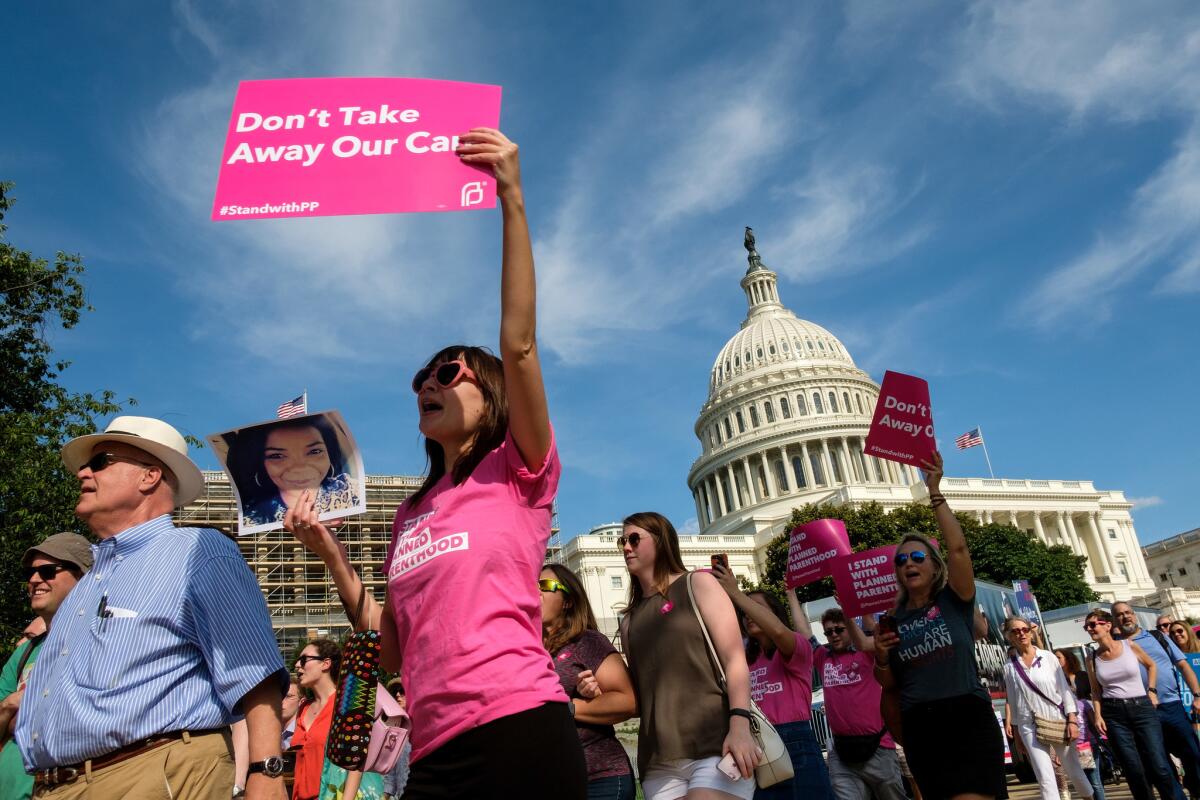Support is dwindling and time’s running out. What’s next for the GOP’s healthcare plan?

Reporting from Washington — Senate Republicans, having hit an apparent impasse in their long campaign to repeal and replace the Affordable Care Act, return to Washington this week in search of a way forward, with support dwindling, time running out and deep divisions within their ranks.
Options are limited as Senate Majority Leader Mitch McConnell (R-Ky.) assesses the legislative landscape for his Obamacare replacement, which has virtually no hope of passing unless it is substantially amended.
The Better Care Reconciliation Act, which threatens to toss 22 million more Americans into the ranks of the uninsured, has been almost universally panned by patient advocacy groups, doctors and other healthcare providers. It is backed by less than 20% of the public, polls show.
And for the last week, rank and file Republican lawmakers have faced rowdy crowds back home opposing the repeal bill.
At the same time, GOP senators return to work aware that federal intervention is needed to stabilize some Obamacare insurance markets. If not, insurance premiums in some parts of the country could skyrocket, and many Americans — especially those in rural areas — could be left with few healthcare options.
Now, with President Trump sending mixed signals on the path forward, Republicans confront the very real possibility that their promises to end Obamacare might need to be shelved in favor of a bipartisan agreement to improve it.
“For seven years, they pretended like they were all committed to repeal and there were just tactical differences,” said Michael A. Needham, CEO of Heritage Action, a leading conservative advocacy group.
“What we learned this year is there are not tactical differences. There are large numbers of Republicans in the House and the Senate who don’t want to repeal Obamacare.”
That’s not the outcome Republicans had in mind when they set out seven years ago to undo President Obama’s signature domestic achievement.
But as Congress resumes work this week, McConnell is under mounting pressure to develop a face-saving way out.
“They need to start over,” said Dr. Jack Ende, a University of Pennsylvania primary care doctor and president of the American College of Physicians.
“This is a bill that takes away much needed health insurance and healthcare from the people who need it most. You can’t tweak it a little here and little there. … The right strategy is to work on improving what we have.”
Democrats say they are willing to work with Republicans to fix Obamacare, but only after the GOP drops its repeal campaign.
Conservatives warn that doing so would be a political disaster for the GOP, sapping enthusiasm from activists who will be needed soon to start knocking on doors and turning out votes for the 2018 midterm elections.
“If this party switches from repeal of Obamacare to a bailout of Obamacare,” said Needham, “that is catastrophic.”
McConnell, often considered an opportunistic strategist, might still be able to salvage his bill.
But even senators are unsure of his next moves. And the heathcare legislation has shown the limits of his ability to cobble together the 50 votes needed from a 52-seat Senate GOP majority. Votes are not expected until mid-July, at the earliest.
“Clearly, the draft plan is dead,” said Sen. Bill Cassidy (R-La.), a physician who has offered his own proposal.
“Is the serious rewrite plan dead?” he asked in an interview on “Fox News Sunday.” “I don’t know. I haven’t seen the serious rewrite.”
McConnell’s efforts have been complicated by the deep divisions among Republican senators. The majority leader was forced to put off a vote on the bill last month amid opposition from both conservatives and centrists.
“Whether or not we can come together, I don’t know,” Sen. Lindsey Graham (R-S.C.) said Sunday on “Meet the Press.”
Conservatives want the most complete repeal of Obamacare possible, and they have opened a direct line of negotiation with the White House, appearing to turn Trump to their side, for now.
Sen. Ted Cruz (R-Texas) and Sen. Mike Lee (R-Utah) back a proposal that would dramatically roll back insurance protections in the current law, allowing insurers to offer cheaper, skimpier health policies they say would drive down costs, at least for healthy consumers.
An assessment of Cruz’s “consumer choice” plan is expected this week from the nonpartisan Congressional Budget Office.
“There’s no doubt this has been a rocky path,” Cruz said Sunday on “Face the Nation.” “But I continue to believe we can get this done.”
But other GOP senators and advocacy groups are warning that Cruz’s plan would further destabilize insurance markets by dividing healthier and sicker consumers.
Republican Sen. Charles E. Grassley of Iowa said last week he worried that the Cruz amendment could be a “subterfuge” to get around Obamacare’s protections for those with preexisting conditions. “Obviously, I would object to that,” he told Iowa Public Radio.
Politically, the Cruz approach does little to help McConnell amass 50 votes for passage. Although it pleases conservatives who say the Senate GOP bill does not go far enough in ending Obamacare’s insurance mandates, it is almost certain to drive away more centrist Republicans.
The centrists have been most concerned about steep cuts to Medicaid. McConnell’s bill would slash nearly $800 billion from the government’s healthcare safety net over the decade and leave millions of poor Americans without access to care. Particularly hard hit would be poorer, rural counties, many of which backed Trump last year.
In Nevada, the Medicaid cuts would leave nearly 200,000 uninsured, prompting the state’s Republican senator, Dean Heller, to oppose the bill.
Sens. Rob Portman (R-Ohio) and Shelley Moore Capito (R-W.V.), whose states rely heavily on Medicaid money to address the opioid crisis, are also opposed to the bill. They have sought tens of billions of dollars to make up for the lost funds.
One idea floated to preserve some healthcare aid would retain a 3.8% tax in investment income imposed by Obamacare on high-income households. That would maintain about $175 billion in revenue over the decade that could help with Medicaid.
But making a concession like that for centrist senators risks losing conservatives who want all taxes in the current healthcare law repealed.
McConnell has been trying to stitch together enough votes by tacking on amendments and provisions to meet the needs of both flanks of his party.
But with barely a dozen legislative days before Congress recesses for the monthlong August break — and other priorities that need action — the Senate has limited time.
Trump has further complicated McConnell’s task, giving mixed signals about how he wants to proceed.
Earlier this year, the president pushed to repeal the current law and replace it “simultaneously,” undermining the Senate Republican leader’s original plan to repeal the law now and replace it in a few years.
Last week, Trump abruptly shifted positions, siding with Sens. Ben Sasse (R-Neb.) and Rand Paul (R-Ky.) who have revived McConnell’s original plan as their own.
That repeal now, replace later concept has long been the preferred approach of the powerful Koch network of conservative advocacy organizations and was floated again last month at the group’s semi-annual retreat for wealthy donors.
“The president gets our concerns. I think he shares our concerns,” said Paul’s spokesman. “Also he wants to get to a final bill.”
As the debate continues, resistance is building. Protesters have been camping out and picketing lawmakers’ offices. As many as a dozen Republican senators now oppose the bill, a number that will likely grow.
“There’s no constituency for this bill,” said one GOP aide in the Senate, granted anonymity to discuss the private assessments. “If we don’t vote for it, who’s going to be burning up our phones?”
ALSO
Kids in pro-Trump rural areas have a lot to lose if GOP rolls back Medicaid
Trump wants a border wall, but few in Congress want to pay for it
More coverage of politics and the White House
More to Read
Get the L.A. Times Politics newsletter
Deeply reported insights into legislation, politics and policy from Sacramento, Washington and beyond. In your inbox three times per week.
You may occasionally receive promotional content from the Los Angeles Times.












